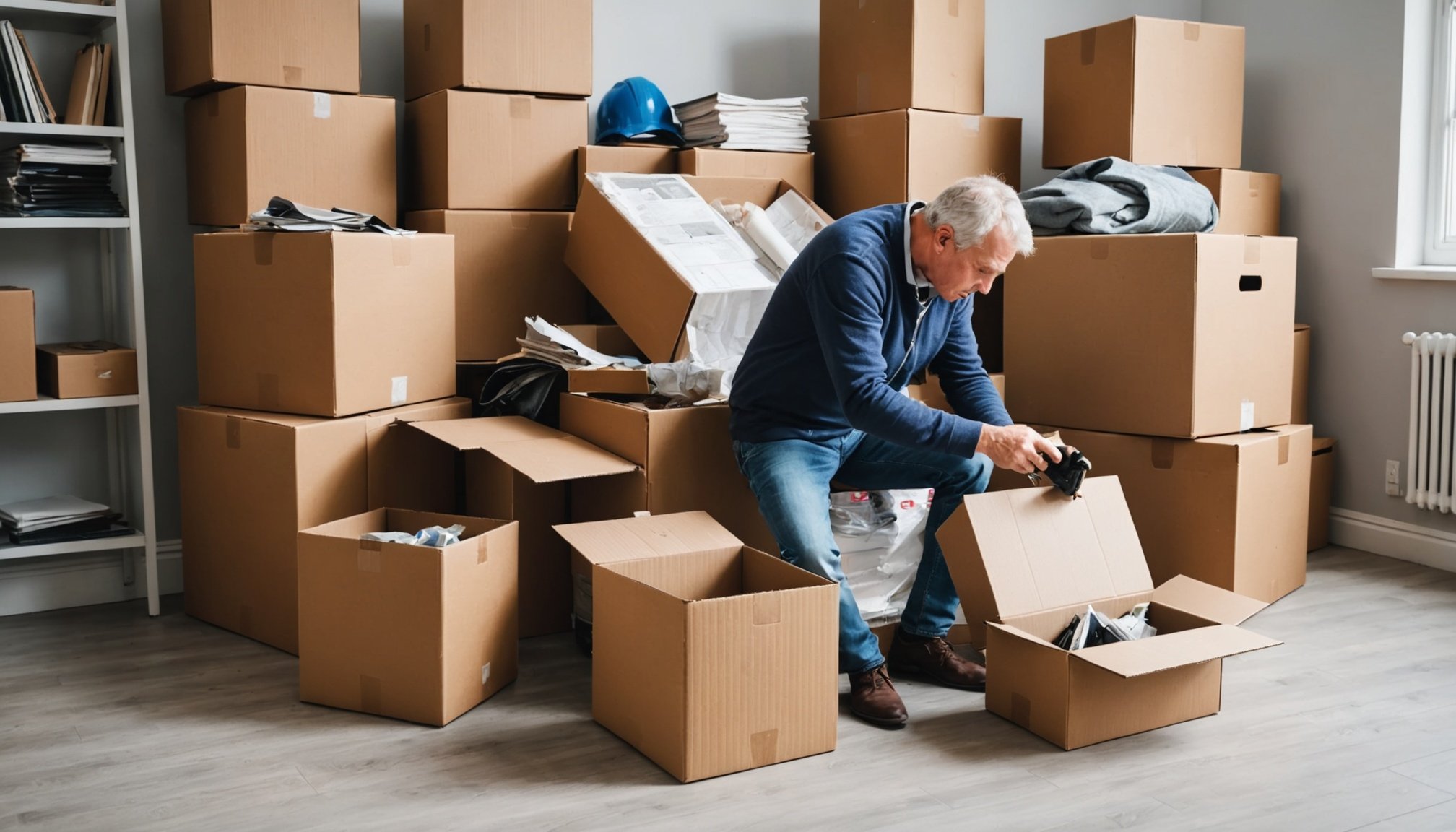Understanding the Importance of Proper Disposal Before Moving
Organizing a move can become a daunting task without the right approach to disposal methods. The accumulation of clutter can significantly hinder moving efforts, making it essential to adopt efficient practices. Before relocating, it is advisable to sort through belongings and decide what truly merits the move. This approach not only simplifies the relocating process but also reduces the cost of transporting unnecessary items.
Incorporating eco-friendly practices when disposing of items is equally vital. Such practices include recycling, donating usable goods, and properly discarding hazardous waste. Responsible disposal aids in reducing the environmental footprint associated with moving by minimizing landfill contributions.
This might interest you : Ultimate Guide to Safely Packing and Relocating Your Extensive Book Collection Across the UK
Adhering to legal obligations for waste disposal in the UK is crucial. The nation mandates specific regulations to ensure waste is managed responsibly. Households must comply with these guidelines to avoid potential penalties. This includes understanding what items require special handling, such as electronics and chemical products.
By implementing thoughtful disposal methods, individuals can seamlessly transition to their new homes, benefiting both themselves and the environment. Proper planning supports a minimalistic lifestyle, ensuring homes remain free from unnecessary clutter, and promoting a cleaner, more sustainable planet.
In parallel : Top Challenges to Expect When Moving to a Rural Home in the UK: A Comprehensive Guide
Assessing Your Unwanted Items
Taking stock of your belongings can seem daunting but becomes manageable with a structured inventory assessment. The decluttering process involves clear steps: evaluating what to keep, donate, recycle, or dispose of.
Begin by categorizing items into four groups: keep, donate, recycle, and dispose. Keep items are those essential for daily life or hold significant value. Donation-worthy items are in good condition and could benefit others. Recycle items that are end-of-life in terms of usefulness but can be broken down and reused. Lastly, dispose of items beyond repair or out of use.
The emotional aspect of letting go should not be underestimated. Objects often carry sentimental value, presenting a challenge in decluttering. To navigate this, ask yourself: does this item align with my current lifestyle? If not, consider if its emotional value can be preserved through alternative means, like photographs.
Recognizing the positive impact decluttering can have on your space and well-being aids in overcoming emotional resistance. By systematically approaching your inventory assessment, you establish clarity and create a more organized environment to thrive in. Embrace the process as a journey towards a more purposeful living space.
Disposal Methods for Unwanted Items
Understanding how to effectively manage unwanted items is crucial for reducing waste and environmental impact. Various disposal methods are available, and following local regulations ensures responsible practices.
Recycling Unwanted Items
Many materials are recyclable, such as plastics, metals, paper, and glass. Identifying what can be recycled helps minimize landfill waste. Local recycling centers are pivotal in this process. They usually provide specific guidelines to follow, such as how to sort and clean items before bringing them in. Preparing items properly for recycling enhances efficiency and ensures adherence to regulations.
Donating Usable Items
Donating items still in good condition extends their usefulness and aids communities. Numerous charities and organisations accept donations of clothing, furniture, and electronics. It’s important to follow their guidelines regarding condition and type. Donating has numerous benefits over disposal, creating less waste and supporting those in need.
Responsible Waste Disposal
Local waste disposal regulations often dictate how and where items should be discarded. Understanding these rules and scheduling bulk pickups when needed keeps neighbourhoods tidy and compliant. Exploring alternatives, like composting or creative reuse, further reduces reliance on landfills and supports a sustainable community.
Adopting these methods comprehensively addresses the challenges of waste management while promoting environmental responsibility.
Resources for Disposal and Donation
Navigating the options for disposal resources and recycling services can often feel overwhelming. Luckily, there are a variety of solutions that cater to these needs, allowing individuals to make informed decisions.
Local charity shops and services provide an excellent way to donate items you no longer require. These local charities often accept a wide range of goods, ranging from clothing to furniture. By donating to these establishments, not only are you reducing waste, but also supporting community initiatives. Consider reaching out to nearby organisations to understand their specific needs and guidelines.
For those eager to engage with recycling services, finding a recycling centre nearby can be achieved through governmental websites or dedicated recycling platforms. It’s an eco-friendly way to ensure that your items are repurposed or disposed of correctly. Each facility often has criteria on what can be accepted, so ensure you are aware of these before visiting.
In addition, exploring online platforms can be beneficial for either selling or giving away unwanted belongings. These platforms connect you with individuals in need or seeking specific items, ensuring your goods find a new home. Websites like Freecycle or local Facebook marketplace groups offer convenient ways to give back without the hassle of in-person exchanges.
Planning Ahead for Your Move
Embarking on a move can feel overwhelming, but creating a moving checklist is a practical step towards seamless execution. Begin by establishing a timeline that adequately incorporates both decluttering and disposal tasks. It is advisable to initiate decluttering several weeks in advance.
Start by identifying items you no longer use and categorise them into sections: donate, recycle, and discard. This strategy prevents the frequent oversight of accumulating unwanted items that may complicate the move. Ensuring that disposal tasks are part of your checklist can avert last-minute rushes.
Preparation tips emphasise the significance of systematic sorting. Allocate specific days for each room, making the task less daunting. Consider eco-friendly disposal methods, and set aside time for taking items to recycling centres or scheduling pick-ups for donations.
Timeline coordination is crucial. Start by working backwards from your moving date, earmarking specific periods for each milestone. This will not only help you stay on track but also highlight potential bottlenecks.
To avoid last-minute disposal challenges, adhere strictly to your checklist. Avoid adding unnecessary items to the load by periodically reassessing your possessions. Effective planning will leave you with a clear path and reduce stress.
Frequently Asked Questions
When planning a move, understanding the nuances of disposal procedures is essential. This section addresses some common questions to provide clarity.
What are the best tips for disposing of electronics during a move? It’s important to differentiate between functional and non-functional electronics. Find local e-waste facilities or recycling programs—many retailers offer take-back schemes for electronics disposal. Avoid throwing electronics in regular garbage, as this can harm the environment.
How should hazardous materials be handled during relocation? Check for any local regulations governing the disposal of hazardous waste, including paints, chemicals, and batteries. Most areas have designated drop-off points. Never dispose of these materials in household trash as they pose environmental risks and often violate laws.
Be aware of local regulations to ensure compliance. For instance, many municipalities require permits for large-scale disposals or specific items like mattresses and appliances. Following these local guidelines not only ensures a smooth move but also demonstrates environmental responsibility.
For all your moving tips, being informed about the specific disposal rules and options in your area is crucial. By addressing these disposal FAQs, you can make informed, responsible decisions, enhancing the effectiveness and eco-friendliness of your move.











